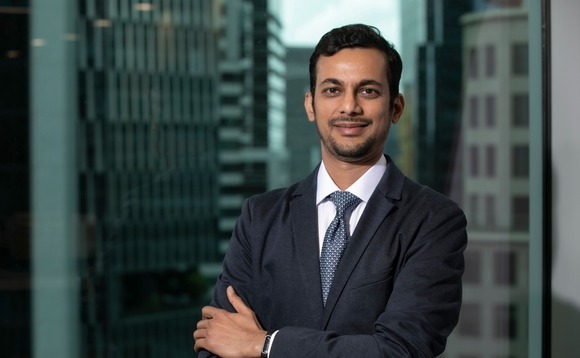
Q&A: OMERS' Ani Deshmukh

Ontario Municipal Employees Retirement System (OMERS) recently backed a spinout of Olympus Capital Asia’s credit team as Orion Capital Asia. Ani Deshmukh, a director with the Canadian pension fund, explains its regional strategy
Q: How has the OMERS credit strategy evolved globally?
A: From 2015, we started shifting more into private assets, which meant looking beyond public markets – including rate-sensitive and investment-grade products – to high yield leveraged loans. We have a large book run out of Toronto that looks at American and developed markets high yield and leveraged loans. There are also some third-party relationships, such as mid-market lending in the US. This has accelerated over the last five or six years, having more exposure to the private markets space to get more alpha.
Q: Where does Asia fit into this?
A: We want to take advantage of opportunities we see on the public side and on the private markets direct lending side. We only started investing in Asia credit over the last 12 months, but we will build a book that blends those two things together.
Q: How frequently do you work with external fund managers?
A: OMERS does a lot of investing on balance sheet – probably 90% of total investments – and a small amount goes to third-party managers. We will look at third-party managers where they have complementary skills or where they offer access to markets in which we don't have a local presence and to assets classes in which we don't have in-house expertise. We have third-party relationships in credit, infrastructure, and other asset classes, and we try to co-invest alongside these managers to scale up our exposure. The Orion partnership wasn't unprecedented from an OMERS perspective, but it's the first time we have done something like this in Asia. It was an opportunity to work with a high-quality team. There are only so many people who have done deals and gone through cycles. You want to back teams that have been through one or two funds and have demonstrated an ability to invest and harvest the money. Harvesting is important.
Q: What are you looking to do in Asia outside of the Orion relationship?
A: We are doing balance sheet lending as well, and we are building out a team in the Asia credit vertical. There are three of us right now, but we are actively looking to add people. Over the next couple of quarters, we should get to five or six. We are interested in mid-level people who have experience underwriting risk in Asia. OMERS has a 10% allocation to Asia and credit is a small part of that. The plan for the next 4-5 years is to have at least 15% of total assets in the region. Credit must catch up with other asset classes like infrastructure, equities, and real estate, so there is a long road ahead in terms of deployment. We want to be similar to equities in terms of dollars invested.
Q: Where in the capital structure do you expect to be most active?
A: We are interested in performing credit in general, it could be high yield or direct lending. There is a broad swathe of things we can do: senior and second lien for operating companies; term loan A, term loan B, and unitranche in markets like Australia; and then the mezzanine financing space is picking up, especially as it pertains to sponsor financing. We will also look at specific opportunities in terms of lending against shares or holdco financing. We try to underwrite the borrower first and see how we can partner with them across the capital structure.
Q: And what about in terms of geography?
A: The big markets are China, India, and Australia. China is interesting from an offshore lending perspective – there is a vibrant dollar bond market and loan market – and then India is attractive for onshore and offshore financing. Given there are dislocations within the domestic lender groups, there is a big opportunity for us. In Australia, there is a wide range of sponsor financing opportunities as well as lending to sectors like mining and real estate. We have done deals from $25-30 million to $130-140 million. It really depends on the opportunity set. However, we are a small team, so we don't want to do deals that are too small and spread ourselves too thin.
Q: In a market like India, for example, where does the Orion strategy stop and the OMERS ex-Orion strategy start?
A: We operate largely as one team and we approach underwriting together. There is no competition in terms of what we want to look at. They have a good niche in mid-market lending, and they will continue to do that. We will focus more on syndicated and club deals that come out of India that tend towards the larger deal sizes, typically partnering with asset managers and banks. With NBFCs stepping back, several larger names are looking to expand their lender bases. We are doing due diligence on a couple of deals now.
Q: What big picture themes do you see in Asia credit?
A: Asia has been a very bank-led market, but that is slowly changing. First, local liquidity is not as abundant as it has been in recent years, especially for some of these larger markets. Therefore, at the margins you are seeing borrowers not starving but looking for other sources of capital. Second, sponsor-led activity is growing. Australia has traditionally been the place for that, but we are seeing more deals coming out in Hong Kong, Singapore, India, and Vietnam.
Q: How does OMERS differentiate itself from other credit investors?
A: We are a source of perpetual capital, so we can underwrite situations that asset managers might find hard to underwrite. We are also very flexible in terms of where we feature in the capital structure. We can look at everything from the wider end of the senior secured space all the way to the mezzanine lending space. Managers that are more siloed by asset class do not have this flexibility and it impacts deal structuring.
Latest News
Asian GPs slow implementation of ESG policies - survey
Asia-based private equity firms are assigning more dedicated resources to environment, social, and governance (ESG) programmes, but policy changes have slowed in the past 12 months, in part due to concerns raised internally and by LPs, according to a...
Singapore fintech start-up LXA gets $10m seed round
New Enterprise Associates (NEA) has led a USD 10m seed round for Singapore’s LXA, a financial technology start-up launched by a former Asia senior executive at The Blackstone Group.
India's InCred announces $60m round, claims unicorn status
Indian non-bank lender InCred Financial Services said it has received INR 5bn (USD 60m) at a valuation of at least USD 1bn from unnamed investors including “a global private equity fund.”
Insight leads $50m round for Australia's Roller
Insight Partners has led a USD 50m round for Australia’s Roller, a venue management software provider specializing in family fun parks.





